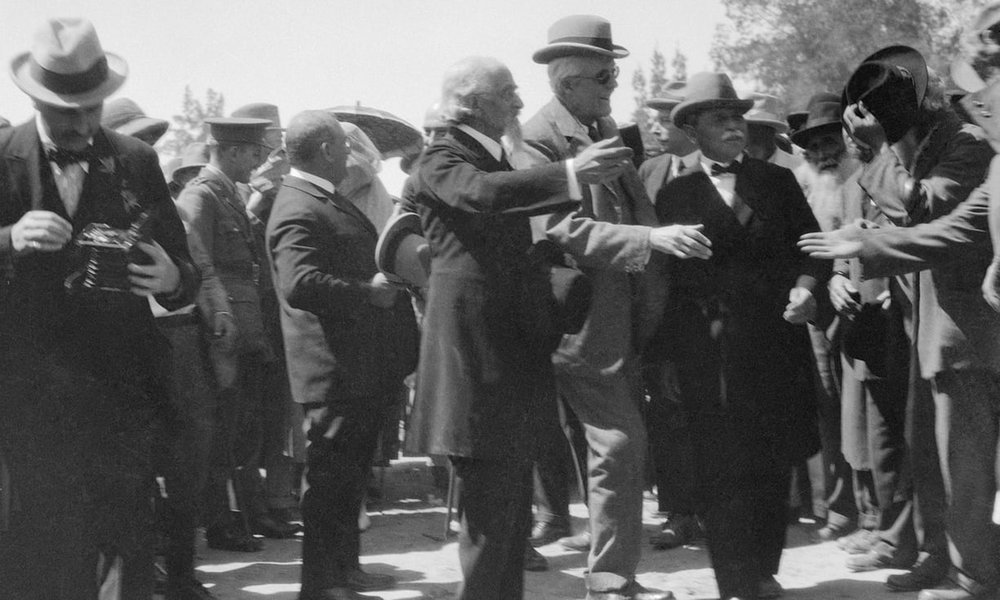Britain must atone for the Balfour declaration – and 100 years of suffering

Many British people will not know of Sir Arthur James Balfour, an early 20th century foreign secretary. For 12 million Palestinians, his name is all too familiar. On the 100th anniversary of the Balfour declaration, the British government should take the opportunity to make things right.
At his desk in London, on 2 November 1917, Balfour signed a letter promising the land of Palestine to the Zionist Federation, a recently established political movement whose goal was the creation of a Jewish state. He promised a land that was not his to promise, disregarding the political rights of those who already lived there. For the Palestinian people – my people – the events this letter triggered have been as devastating as they have been far-reaching.
This British policy, to support Jewish immigration into Palestine while negating the Arab-Palestinian right to self-determination, created severe tensions between European Jewish immigrants and the native Palestinian population. Palestine (the last item on the decolonization agenda) and we, its people, who sought our inalienable right to self-determination, instead suffered our greatest catastrophe – in Arabic the Nakba.
The darkest day
In 1948 Zionist militias forcibly expelled more than 800,000 men, women and children from their homeland, perpetrating horrific massacres and destroying hundreds of villages in the process. I was 13 years old at the time of our expulsion from Safad. The occasion on which Israel celebrates its creation as a state, we Palestinians mark as the darkest day in our history.
The Balfour declaration is not something that can be forgotten. Today, Palestinians number more than 12 million, and are scattered throughout the world. Some were forced out of their homeland in 1948, with more than 6 million still living in exile to this day. Those who managed to remain in their homes number roughly 1.75 million, and live within a system of institutionalized discrimination in what is now the state of Israel.
A century ago, Arthur Balfour signed away Palestinians’ homeland and initiated decades of persecution. It is cause for humility, not celebration.
Approximately 2.9 million live in the West Bank under a draconian military occupation-turned-colonization, with 300,000 of that number being the native inhabitants of Jerusalem, who have so far resisted policies to force them out of their city. Two million live in the Gaza Strip, an open prison subjected to regular destruction through the full force of Israel’s military apparatus.
The Balfour declaration is not something to be celebrated – certainly not while one of the peoples affected continues to suffer such injustice. The creation of a homeland for one people resulted in the dispossession and continuing persecution of another – now a deep imbalance between occupier and occupied. The balance must be redressed, and Britain bears a great deal of responsibility in leading the way. Celebrations must wait for the day when everyone in this land has freedom, dignity and equality.
Humility and courage
The physical act of the signing of the Balfour declaration is in the past – it is not something that can be changed. But it is something that can be made right. This will require humility and courage. It will require coming to terms with the past, recognizing mistakes, and taking concrete steps to correct those mistakes.
I salute the integrity of those British people calling on their government to take such steps: the 274 MPs who voted in favor of recognizing the state of Palestine; the thousands who have petitioned their government to apologies for the Balfour declaration; the NGOs and solidarity groups turning out on the streets, advocating tirelessly for our rights as Palestinians.
Despite the horrors we have endured in the past century, the Palestinian people have remained steadfast. We are a proud nation with a rich heritage of ancient civilizations, and the cradle of the Abrahamic faiths. Over the years we have adapted to the realities around us – the chain of events triggered in 1917 – and made deeply painful compromises for the sake of peace, beginning with the decision to accept a state on only 22% of our historical homeland while recognizing the state of Israel, without any reciprocation thus far.
We have endorsed the two-state solution for the past 30 years, a solution that becomes increasingly impossible with every passing day. As long as the state of Israel continues to be celebrated and rewarded, rather than held accountable to universal standards for its continued violations of international law, it will have no incentive to end the occupation. This is short-sighted.
Israel, and friends of Israel, must realize that the two-state solution may well disappear, but the Palestinian people will still be here. We will continue to strive for our freedom, whether that freedom comes through the two-state solution or ultimately through equal rights for all those inhabiting historic Palestine. It is time for the British government to do its part. Concrete steps towards ending the occupation on the basis of international law and resolutions, including the most recent UN security council resolution 2334, and recognizing the state of Palestine on the 1967 border, with East Jerusalem as its capital, can go some way towards fulfilling the political rights of the Palestinian people.
Only once this injustice is set right will we have the conditions for a just and lasting peace in the Middle East – for the sake of Palestinians, Israelis and the rest of the region.
(Source: The Guardian)
Leave a Comment